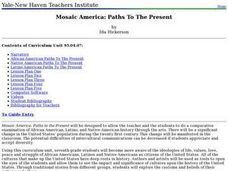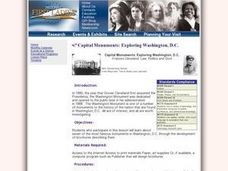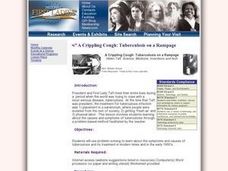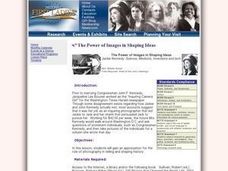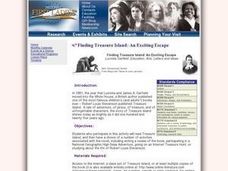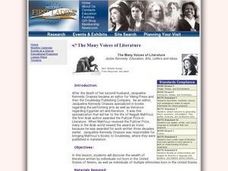Curated OER
Note Taking
Third graders get ready to take notes on a field trip. In this notetaking lesson, 3rd graders take notes to remember what they've seen on a field trip. Students draw and analyze diagrams of what they have seen. Students access their...
National First Ladies' Library
Heart Health: Awareness and Research for Women
Learners explore basic heart anatomy, review basic definition of heart disease, research different tests used to diagnose heart disease and heart attacks, discuss what constitutes a "healthy heart" lifestyle, and incorporate it into...
National First Ladies' Library
Fire! The Triangle Shirtwaist Factory Trial and It's Aftermath
Middle schoolers research, examine and are provided the opportunity to re-enact one of the most exciting trials of the 20th century, The Triangle Shirtwaist Factory Trial. They research the history of the trial and then divide into...
Curated OER
Mosaic America: Paths To The Present
Seventh graders study the ideologies of life, values, love, peace and struggle of African Americans, Latinos and Native Americans as citizens of the United States. Authors and artists are used as tools to open the eyes of the students...
National First Ladies' Library
Politics! Politics! The Emergence of Political Parties in the U.S.
High schoolers are split into six small groups which focus on one of six websites, that tell the story of the emergence of the Federalist and Democratic-Republican parties at the end of the 18th century. They compile a chronological list...
National First Ladies' Library
The History of Jim Crow: Legal Racism in America
Students study the history and culture of Jim Crow, as well as the scope of Jim Crow laws across the United States. They consider the concepts of terror and triumph with respect to the history of Jim Crow, the recognition of evidence of...
National First Ladies' Library
Capital Monuments: Exploring Washington, DC Frances Cleveland: Law, Politics and Government
Students, working in small groups, research seven of the most famous monuments found in Washington, DC. They design brochures based on the information they gather from Internet and print resources. Upon completion, they share the...
National First Ladies' Library
Hey, Hey, It's the Beatles!
Young scholars study the Beatles and the contributions their music made to much of the pop music that came afterward. They synthesize complex information and the skills of "compare and contrast" in writing. They research some aspect of...
National First Ladies' Library
Terrorism and Tolerance
Students define the concepts of terrorism and tolerance using various resources. They examine the concept of stereotype, consider stereotypes often applied to Arabs, Middle Easterners, and Muslims, and attempt to discredit these...
National First Ladies' Library
Forming a League of Nations
High schoolers identify and research the original language as composed by Woodrow Wilson in his League of Nations. Then they identify and describe the revisions of the original League of Nations as the United Nations was created....
National First Ladies' Library
Safety or Civil Liberty? The Trial of Sacco and Vanzet
Students investigate the Sacco-Vanzetti trial and develop a basic understanding of the issues involved. Then they write an essay taking a stance on the Sacco-Vanzetti trial: was the trial fair? were the two men falsely accused? Finally,...
National First Ladies' Library
How a Bill Becomes a Law
High schoolers engage in the democratic process and to learn how a bill become a law. Then they write a bill they would like as law in their classroom. Students also form committees that will review the list of bills to determine if they...
National First Ladies' Library
Secretary of Commerce
Middle schoolers gain understanding of economic history of United States in twentieth century by examining role of Department of Commerce. Student groups each analyze one quarter of twentieth century by researching role of Department of...
National First Ladies' Library
A Crippling Cough: Tuberculosis on a Rampage
Students use problem solving skills to examine symptoms, causes, and treatment of tuberculosis in modern times and in early 1900s. Students read patient case, work in teams to diagnose illness, and conduct Internet research to confirm...
National First Ladies' Library
The Power of Images in Shaping Ideas
Learners examine the role of photography in recording and sharing history. They view online photos that Life magazine has identified as changing the world, then conduct research on one of the photos. Learners create and present an oral...
National First Ladies' Library
Finding Treasure Island; An Exciting Escape
Students read Treasure Island. They have a choice of a number of activities associated with the novel, including writing a review of the book. Students also participate in a National Geographic High Seas Adventure, going on an Internet...
National First Ladies' Library
We're off to see the Wizard!
Students explore the process of play and movie making from books. They study the basic elements of drama and write and produce a play based on a chosen theme. Students explain the basic elements of a play by looking at "The Wonderful...
National First Ladies' Library
Latin: The Language of Ancient Rome
Middle schoolers gain understanding about where some of today's words originated by reviewing a list of Latin words and their meanings. They work in small groups to create dictionary pages which will then be compiled into a large...
National First Ladies' Library
Flopsy, Mopsy, Eleanor, and Beatrix
Young scholars read "The Tale of Peter Rabbit" and view the photos of the pets that inspired Beatrix Potter to write. They then select a different book to read from the University of Pennsylvania's website or from the public library that...
National First Ladies' Library
The Many Voices of Literature
Students discover the wealth of literature written by individuals not born in the United States. They discover the literature of individuals of multiple ethnicities born in the United States. Students compile a list of books they would...
National First Ladies' Library
"Just a Little Bit Different": Inclusive Classrooms, Inclusive Schools
Learners explore visible and invisible differences, those of language, religion, dress, ethnicity, gender, etc. with their classmates. They play Bingo with a created list of classroom differences. Afterward, they write a short paper...
National First Ladies' Library
The Education of Abigail Adams
Learners read the biography of Abigail Smith Adams from the First Ladies Library web site. They work in small groups to write a description of her education. Students discuss their findings, and extend this to the education of girls in...
National First Ladies' Library
Blunders on All Sides: The Battle of Bunker Hill
High schoolers investigate the concepts surrounding the historical battle of Bunker Hill while conducting online research using a variety of resources. The information is used in order to create a newspaper article telling about the...
National First Ladies' Library
Why Do We Have Libraries?
Students investigate the reason and origins of libraries and conduct an information search using a variety of resources. They are divided into groups that have a specific set of questions they are to answer. Each group will then complete...





